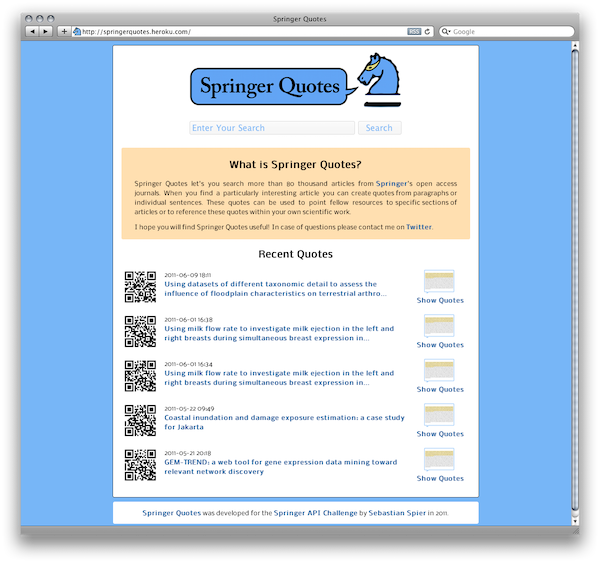Developer Challenges – Lessons Learned

In 2011 I participated in the 1st ever Springer API Challenge. Here is what I learned about developer challenges in general and how they can be beneficial for both developers and companies.
What is the Springer API Challenge?
Springer is a publishing house with 5500 employees and a yearly revenue of 850 Mil EUR - in short they are not small. They are focusing on scientific publications in German speaking countries.
At the end of 2010 Springer decided to open up access to their scientific content (mainly articles and images) via an API. In order to motivate developers to create innovative applications around their services, they set up the Springer API Challenge.
Springer Quotes

Even before the Springer API Challenge, I had frequently read about similar development contests, and had been curious to find out what developers and companies get out of them. So when I saw that Springer would host such a challenge, I thought I should give it a try, to find out if I could come up with something that Springer would consider prize worthy.
The application I came up with is called Springer Quotes. Springer Quotes is a single purpose application: It lets you search articles from Springer’s open access journals. When you find a particularly interesting section in an article you can create quotes from paragraphs or individual sentences, and share these quotes with others directly via the web.
Although Springer Quotes has a rather niche use case, Springer apparently liked it, as they awarded it with the 1st prize (press release in German). Other contestants developed KontentLinks (now kleenk.com), which lets you create more meaningful links between articles, and JournalSuggest which helps scientists to publish their papers to the right Journal.
Lessons Learned
Here a couple of thoughts, after taking part in the API Challenge:
- [participants] Be a doer: It is always worthwhile to invest energy and time into something that you are genuinely interested in. Even without the extra bonus of winning something, taking part in this contest taught me a lot, both in terms of development skills, and focusing on what I considered important in order to convince the Springer jury.
- [companies] Know your objectives: A developer challenge like this is not the right thing for every product/service. Before setting up such a contest, companies need to make sure that they know their objectives very clearly. One important aspect is, to find ways to channel the creativity of the contestants in the right direction, in order to get the most out of the investment.
- [companies] Engage with the community: During the contest the participating developers will have a lot of questions. Make sure that before starting the contest you have the tools and resources in place to keep up with the increased community communication.
- [companies] Use the results: Before starting, you should know how you want to use the results of the contest. Do you want to try to integrate them into existing products, build new products out of it, or just use the contest for PR purposes?

What about Springer? What did they get out of this? I don’t know it for a fact but at least they liked the API Challenge 1.0 enough to launch the Springer API Challenge 2.0 a year later. So apparently it wasn’t that bad for them either.
So much for Springer Quotes. Unfortunately the App is no longer online but you can take a look at the source code on github.
Final remarks: If you are a developer and have some spare time, just try yourself in a developer challenge. It is a lot of fun!
This post was originally published at underthehood.meltwater.com/blog/2013/01/18/developer-challenges-lessons-learned/.
